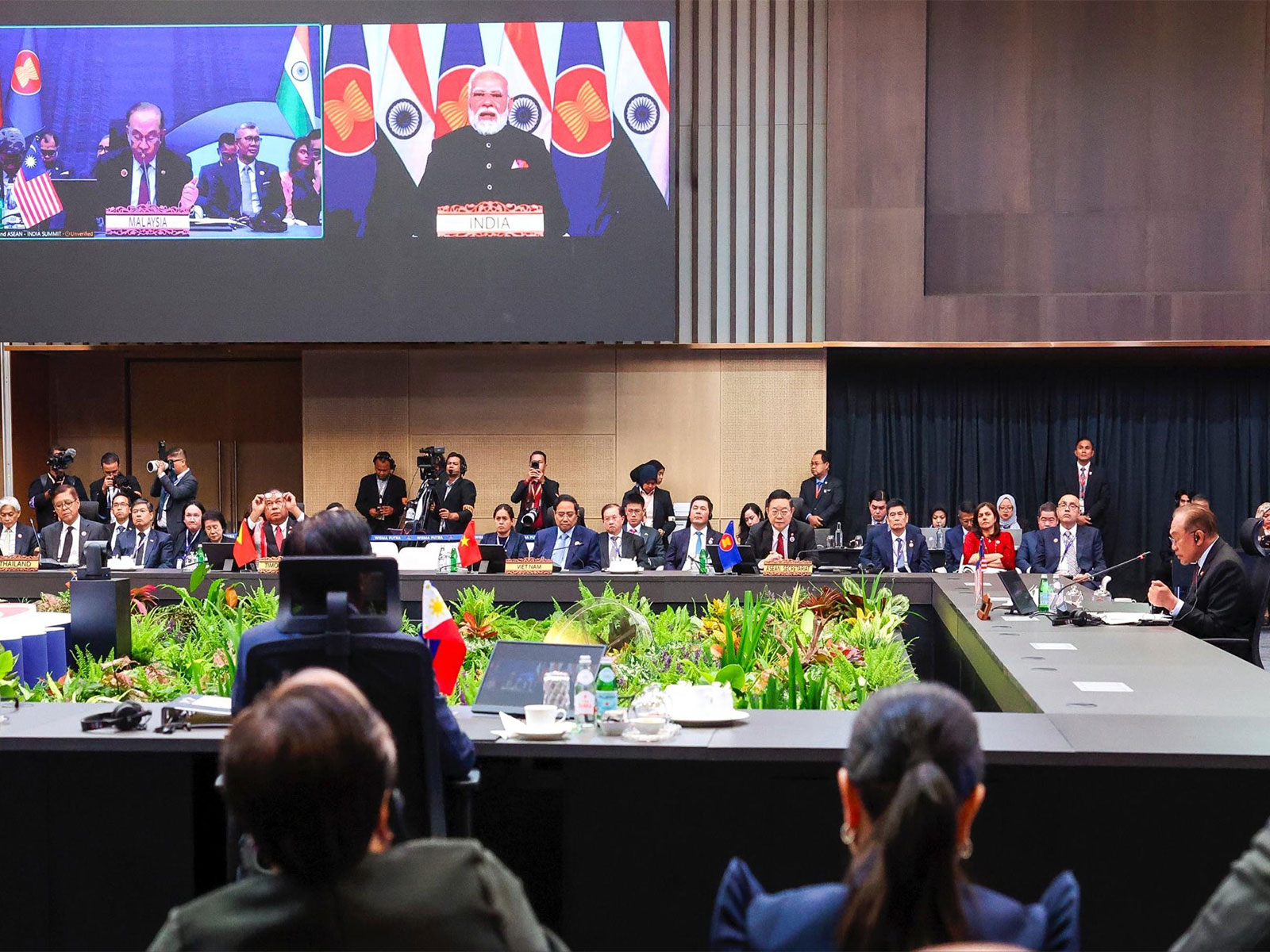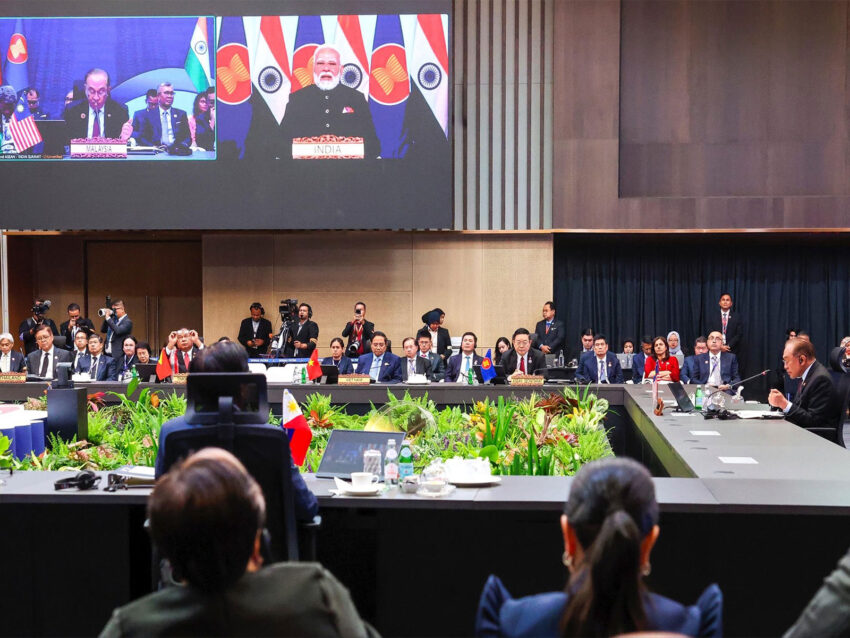
Kuala Lumpur [Malaysia], October 26 (ANI): Prime Minister Narendra Modi on Sunday declared the 21st century as the “century of India and ASEAN”, while highlighting that the partnership between the two sides goes beyond trade and is deeply rooted in cultural, historical, and civilisational ties, during his virtual address at the 22nd ASEAN-India Summit in Kuala Lumpur.
Congratulating Malaysian Prime Minister Anwar Ibrahim for successfully hosting the summit, PM Modi expressed condolences on the demise of Thailand’s Queen Mother.
Speaking on the summit theme, ‘Inclusivity and Sustainability’, PM Modi said it reflects shared priorities in digital inclusion, food security, and resilient supply chains.
He described ASEAN as the “main pillar of India’s Act East Policy” while extending a warm welcome to Timor-Leste, which was formally inducted as the eleventh member of the grouping at the ongoing summit in Kuala Lumpur, Malaysia.
“India and ASEAN together represent one-fourth of the global population. We not only share geography, we share deep historic relations and shared values. We are part of the global south. We not only share trade relations but also cultural relations. ASEAN is the main pillar of India’s Act East Policy. India has always supported ASEAN Centrality and ASEAN’s outlook on the Indo-Pacific,” the Prime Minister said.
Introduced in 1992, the Look East policy focused primarily on economic ties with Southeast Asia. With the changing dynamics of the world, PM Modi, in 2014, introduced a new vigour in India’s foreign policy and transformed the Look East Policy into a more dynamic Act East Policy (AEP), emphasising stronger action and outcomes.
In a key announcement, PM Modi declared 2026 as the ‘Year of ASEAN-India Maritime Cooperation’ to strengthen collaboration across education, tourism, science and technology, health, green energy, and cybersecurity.
“Our collaboration in HADR, sea security, and the blue economy is rapidly increasing. Seeing this, we declare 2026 as the ‘Year of ASEAN-India Maritime Cooperation’,” the PM said.
“The 21st century is our century. It is India and ASEAN’s century. I am confident that the aim of ‘ASEAN Community Vision 2045’ and ‘Viksit Bharat 2047’ will develop a bright future for the entirety of humanity,” he concluded.
The member states of the Association of Southeast Asian Nations (ASEAN) and India have also reaffirmed their commitment to promoting sustainable tourism and preserving cultural heritage during the summit.
In a joint declaration, the member states highlighted the vital contribution of tourism to economic growth, job creation, infrastructure development, and cross-cultural understanding, while acknowledging the need to maintain high standards of safety, service, and visitor satisfaction.
The declaration emphasised the adoption of environmentally sustainable, socio-culturally responsible, and economically viable tourism practices. Measures include promoting green, blue, and circular economy principles; minimising pollution; protecting biodiversity; supporting women, youth, and local communities; and encouraging low-carbon, resource-efficient infrastructure.
The ASEAN-India partnership also pledged to conserve historic and cultural heritage, integrate local arts, handicrafts, gastronomy, and museums into tourism, and strengthen capacity building through knowledge sharing, digital technologies, and institutional collaboration.
The leaders also underscored the importance of tourism as a driver of regional cooperation and people-to-people contacts, noting that the ASEAN-India Year of Tourism 2025 is a platform to showcase sustainable tourism initiatives and enhance regional connectivity.
Earlier today, Timor-Leste became the 11th member of the Association of Southeast Asian Nations (ASEAN). This is ASEAN’s first expansion in 26 years since Cambodia was admitted in 1999. The island nation had applied for membership in 2011.
This is ASEAN’s first expansion in 26 years since Cambodia was admitted in 1999. The island nation had applied for membership in 2011.
Timor-Leste’s Prime Minister Xanana Gusmao joined the 10 ASEAN leaders for the signing of documents confirming the nation’s long-awaited entry.
Meanwhile, Thailand and Cambodia signed a joint declaration on a peace deal in the presence of US President Donald Trump and Malaysian Prime Minister Anwar Ibrahim, marking a formal step toward halting hostilities and restoring peace along their disputed border.
The agreement, dubbed the “KL PEACE Accord,” was signed by Thai Prime Minister Anutin Charnvirakul and his Cambodian counterpart, Hun Manet, on the sidelines of the 47th ASEAN Summit, which began today under the chairmanship of Malaysia.
Speaking at the event, President Trump said, “This is a momentous day for all of the people of Southeast Asia as we sign a historic agreement to end the military conflict between Cambodia and Thailand.”
Japan’s newly elected Prime Minister Sanae Takaichi held talks with US President Donald Trump and agreed to strengthen the bilateral alliance during their first telephone talks, according to the Japanese premier’s office.
The telephone call between the two leaders was held on October 25, while they were attending ASEAN-related Summit meetings in Kuala Lumpur.
The call, which lasted approximately 10 minutes, focused on strengthening bilateral ties and regional cooperation, according to comments posted on the Japanese premier’s official website.
The United States also signed reciprocal trade agreements with Cambodia and Malaysia and a framework agreement with Thailand and Vietnam during the Summit.
“Alongside this peace treaty, we are also signing a major trade deal with Cambodia and a very important critical minerals agreement with Thailand,” Trump said.
ASEAN was established on August 8, 1967, in Bangkok, Thailand, with founding members including Indonesia, Malaysia, the Philippines, Singapore, and Thailand.
Brunei Darussalam, Cambodia, Indonesia, Laos, Malaysia, Myanmar, the Philippines, Singapore, Thailand, Vietnam, and, most recently, Timor-Leste are its members.
The ASEAN Charter provides legal status and an institutional framework, and entered into force in 2008. The ASEAN Secretariat, set up in February 1976, is based in Jakarta.
Malaysia is the ASEAN Chair for 2025, and the Philippines will be the Chair in 2026. India began formal engagement with ASEAN in 1992 as a “Sectoral Dialogue Partner” (at the Secretary level) and subsequently as a “Dialogue Partner” in 1995. (ANI)


